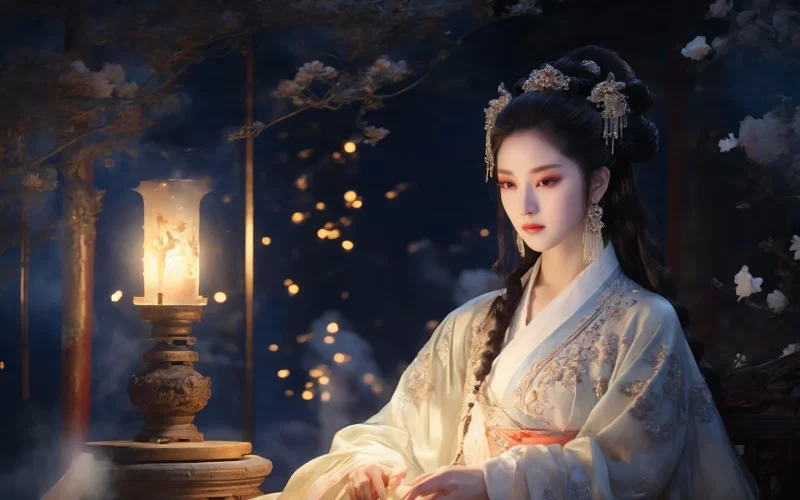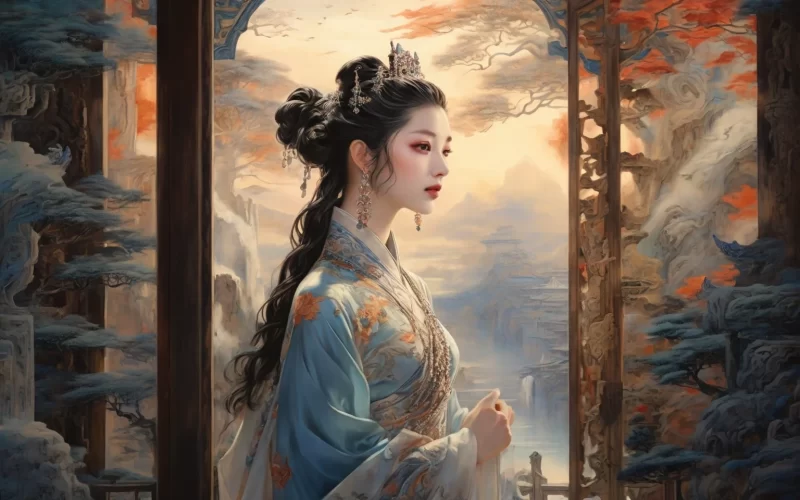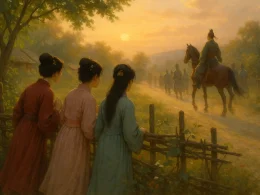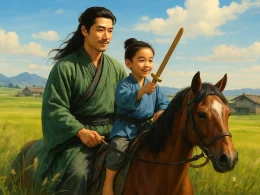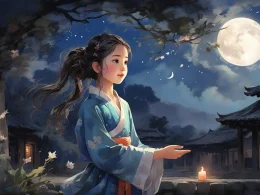Now that a candle-shadow stands on the screen of carven marble
And the River of Heaven slants and the morning stars are low,
Are you sorry for having stolen the potion that has set you
Over purple seas and blue skies, to brood t hrough the long nights?
Original Poem
「嫦娥」
李商隐
云母屏风烛影深,长河渐落晓星沉。
嫦娥应悔偷灵药,碧海青天夜夜心。
Interpretation
This poem takes the mythological story of Chang'e flying to the moon as its subject, but rather than stopping at the plot of Chang'e swallowing the elixir and ascending to heaven, it employs rich imagination to depict her lonely life in the moon palace afterwards. Through this image, the poet projects his own reflections, expressing sorrow about his real-life circumstances.
First Couplet: "云母屏风烛影深,长河渐落晓星沉。"
Yúnmǔ píngfēng zhú yǐng shēn, chánghé jiàn luò xiǎoxīng chén.
On the mica screen, candlelight casts deepening shadows; The Milky Way gradually sinks as morning stars fade.
These opening lines move from indoors to outdoors, presenting a scene of profound tranquility. The interplay of light and shadow on the screen symbolizes the passage of time, while the changing celestial river hints at night's approaching end. The poet creates an atmosphere of distant vastness and poignant beauty, implying the protagonist's solitude.
Second Couplet: "嫦娥应悔偷灵药,碧海青天夜夜心。"
Cháng'é yīng huǐ tōu líng yào, bìhǎi qīngtiān yè yè xīn.
Chang'e must regret stealing the elixir, Facing endless azure seas and blue skies night after night with a lonely heart.
Shifting perspective, the poet speculates about Chang'e's state of mind in third-person narration. While attaining immortality was originally a coveted dream, it brought only endless solitude. This "loneliness at the top" suffering prompts reflection on the relationship between success and isolation, between pursuit and gain/loss.
Overall Appreciation
Using the legend of Chang'e as vehicle, the poem portrays her solitary existence in the moon palace, thereby expressing certain resonances with real life. Though the Moon Palace is magnificent, Chang'e dwells in loneliness without companionship, facing blue skies and seas day after night, filled with endless regret and sorrow. The poet uses this to symbolize life's gains and losses, revealing how success may bring unexpected loneliness, deepening the poetic meaning.
Writing Characteristics
- Symbolic technique with object-allegory: Through Chang'e's image, the poet metaphorically comments on the "loneliness at the top" human condition, making the poem more than mythological narrative but carrying deeper reflection.
- Elegant imagery with profound conception: Images like "mica screen," "candle shadows," "Milky Way," "morning stars," and "azure seas/blue skies" all possess ethereal beauty, creating a lingering artistic conception.
- Emotion-scene fusion with subtle lastingness: Rather than directly expressing Chang'e's loneliness, the poet uses changing scenery and third-person speculation to convey emotion more subtly with enduring resonance.
- Neat antithesis with smooth rhythm: The symmetrical couplets and harmonious rhythm make the poem highly readable and enhance its emotional power.
Insights
This poem not only depicts Chang'e's loneliness and regret, but also refracts life's complexities. Sometimes the goals people pursue so ardently, once attained, may bring not pure happiness but new dilemmas. The poet thus reminds us that success isn't an endpoint - the space between gain and loss often carries unexpected costs. Moreover, the conveyed emotions of loneliness, regret, and longing for warmth can resonate with readers, reminding us to cherish present warmth and companionship while pursuing dreams.
Poem translator
Kiang Kanghu
About the poet
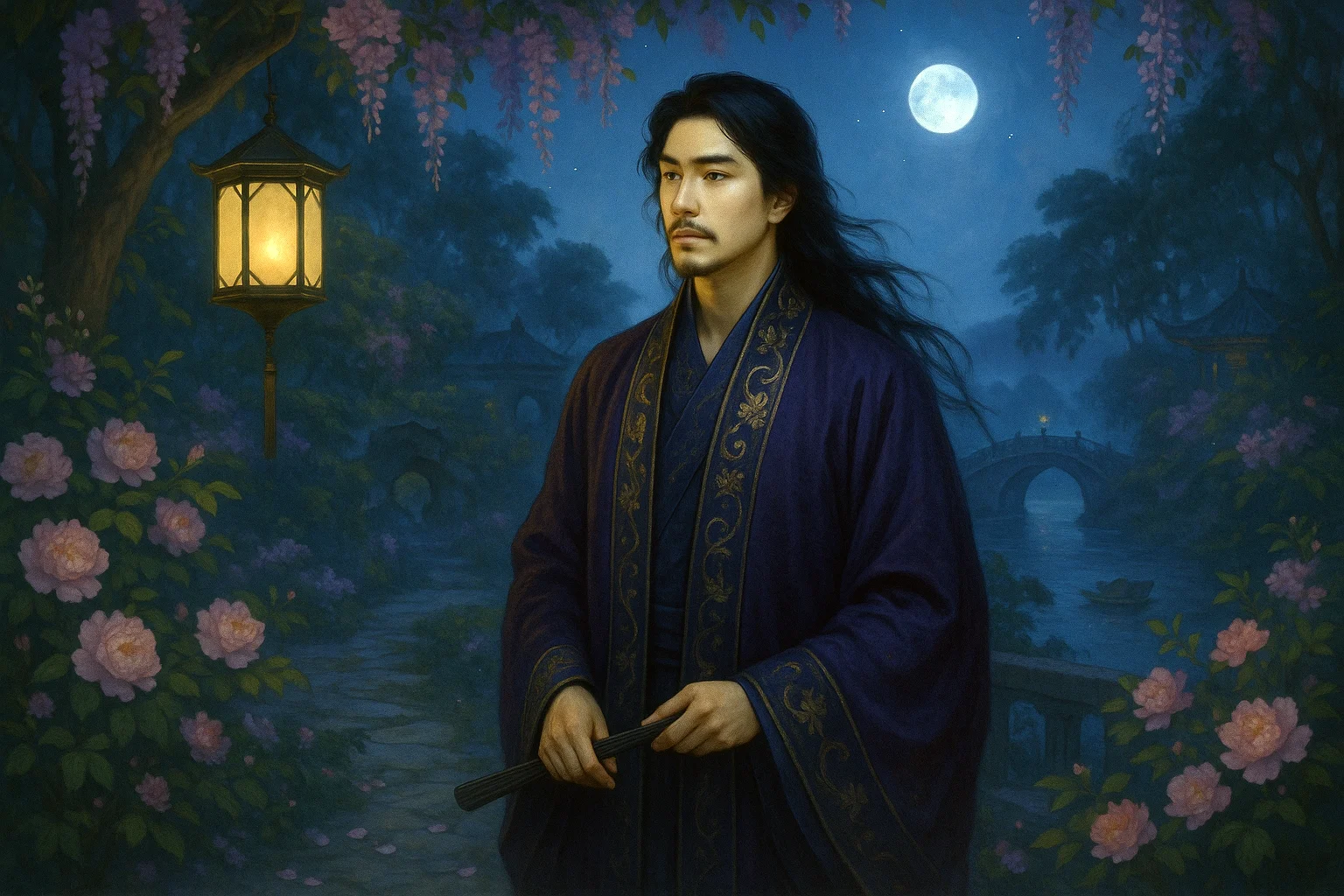
Li Shangyin (李商隐), 813 - 858 AD, was a great poet of the late Tang Dynasty. His poems were on a par with those of Du Mu, and he was known as "Little Li Du". Li Shangyin was a native of Qinyang, Jiaozuo City, Henan Province. When he was a teenager, he lost his father at the age of nine, and was called "Zheshui East and West, half a century of wandering".






